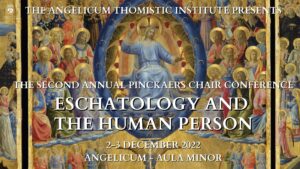“When Israel Came Forth from Egypt”: Aquinas on the Gifts of Judgment and Purgatory
Daria Spezzano
Providence College
Dr. Daria Spezzano is Associate Professor of Theology at Providence College in Providence, Rhode Island. She holds a Ph.D. in Theology from the University of Notre Dame, and a Master’s in Liturgical Studies from the Liturgical Institute. Her book, The Glory of God’s Grace: Deification according to St. Thomas Aquinas, was published by Sapientia Press in 2015. She has published scholarly articles in Nova et Vetera, Cistercian Studies and the Journal of Moral Theology, and chapters in several edited volumes, including Aquinas on Initiation and Mystagogy (Peeters, 2019), Reading Job with St. Thomas Aquinas (CUA Press, 2020), Thomas Aquinas, Biblical Theologian (Emmaus Academic, 2021), and Thomas Aquinas and the Crisis of Christology (Sapientia Press, 2021). Among other projects, she is currently coediting a volume, Christ, the Wisdom of God in the Thought of St. Thomas Aquinas.
“‘When Israel Came Forth from Egypt’: Aquinas on the Gifts of Judgment and Purgatory”
Thomas Aquinas offers helpful insight to catechize contemporary Christians increasingly allergic to the notion of Christ’s eschatological judgment, which necessitates the purification of weak but chosen souls in purgatory. Underlying resistance to these teachings is a postmodern tendency to gnosticism and neo-pelagianism that seeks to avoid the need for Christ’s unique mediation, with a concomitant reluctance to recognize the gravity of sin. St. Thomas offers at least three insights that could be helpful in this addressing this problem. The first concerns why Christ must be our judge in his humanity, the second has to do with our need for judgment and purification, and the third concerns the nature of the judgment and the fruit of purification, when he will “bring to light what is hidden in darkness,” and “each one will receive his praise from God” (1 Cor 4:5). St. Thomas’s teaching on Christ’s power as judge of all the living and the dead, and on the necessity of post-mortem purification for most of the elect, certainly encourages holy fear. But it also shows positively why we need Christ’s wise judgment and our own purification, how these gifts reveal the Father’s love, and therefore why they give reason for joyful hope and gratitude.
Related Content





